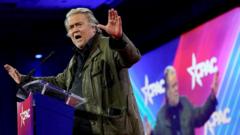Pope Leo XIV, born Robert Francis Prevost in Chicago, has quickly become a contentious figure in U.S. politics following his elevation to the papacy. Donald Trump's MAGA supporters initially perceived the selection of the first American Pope as a win but soon discovered that his views do not align with their "America first" ideology.
While little is known about Pope Leo's political affiliations, he has expressed support for the marginalized and demonstrated criticism of President Trump's hardline policies. Steve Bannon, a former White House strategist, predicted inevitable friction between Pope Leo and the Trump administration, noting the new Pope's presence in liberal discussions.
Pope Leo's brother hinted that he would not shy away from voicing disagreements with the President, especially on immigration issues. Surveys highlight the nuanced relationship between Catholicism and U.S. political affiliations, with many American Catholics expressing views that diverge from the Church's traditional stances.
Responses from the Catholic community in Chicago reflect a sense of disappointment with Trump, as many hope Pope Leo will maintain the progressive agenda established by his predecessor, Pope Francis. The U.S. Conference of Catholic Bishops welcomed his election, emphasizing his call for peace and unity amidst growing divides. However, MAGA supporters are skeptical, voicing concerns about Leo’s alignment with liberal values and questioning his commitment to conservative teachings.
Amid debates about his social media presence, commentators from the hard right have labeled the new Pope as an "elitist" who may undermine Trump’s policies. Leaders within the conservative movement have expressed mixed sentiments regarding Pope Leo's potential trajectory, foreshadowing a complicated relationship between conservative Catholics and the Vatican under his leadership.
As the papacy unfolds, both supporters and critics await to see how Pope Leo XIV will navigate the politically charged landscape of American Catholicism, a realm where personal beliefs and formal Church doctrine often collide.
While little is known about Pope Leo's political affiliations, he has expressed support for the marginalized and demonstrated criticism of President Trump's hardline policies. Steve Bannon, a former White House strategist, predicted inevitable friction between Pope Leo and the Trump administration, noting the new Pope's presence in liberal discussions.
Pope Leo's brother hinted that he would not shy away from voicing disagreements with the President, especially on immigration issues. Surveys highlight the nuanced relationship between Catholicism and U.S. political affiliations, with many American Catholics expressing views that diverge from the Church's traditional stances.
Responses from the Catholic community in Chicago reflect a sense of disappointment with Trump, as many hope Pope Leo will maintain the progressive agenda established by his predecessor, Pope Francis. The U.S. Conference of Catholic Bishops welcomed his election, emphasizing his call for peace and unity amidst growing divides. However, MAGA supporters are skeptical, voicing concerns about Leo’s alignment with liberal values and questioning his commitment to conservative teachings.
Amid debates about his social media presence, commentators from the hard right have labeled the new Pope as an "elitist" who may undermine Trump’s policies. Leaders within the conservative movement have expressed mixed sentiments regarding Pope Leo's potential trajectory, foreshadowing a complicated relationship between conservative Catholics and the Vatican under his leadership.
As the papacy unfolds, both supporters and critics await to see how Pope Leo XIV will navigate the politically charged landscape of American Catholicism, a realm where personal beliefs and formal Church doctrine often collide.




















